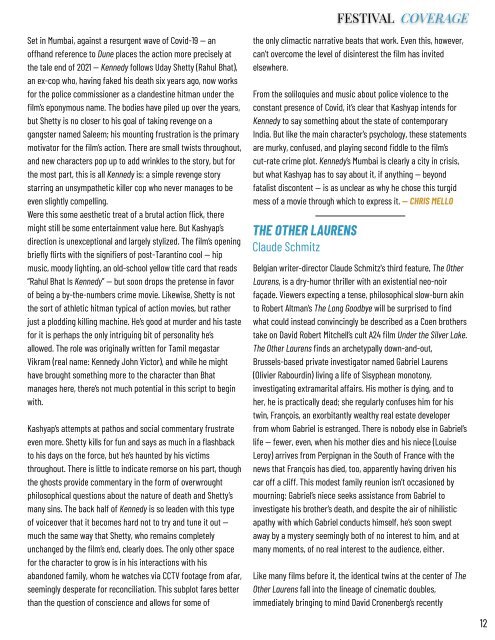You also want an ePaper? Increase the reach of your titles
YUMPU automatically turns print PDFs into web optimized ePapers that Google loves.
FESTIVAL COVERAGE<br />
Set in Mumbai, against a resurgent wave of Covid-19 <strong>—</strong> an<br />
offhand reference to Dune places the action more precisely at<br />
the tale end of 2021 <strong>—</strong> Kennedy follows Uday Shetty (Rahul Bhat),<br />
an ex-cop who, having faked his death six years ago, now works<br />
for the police commissioner as a clandestine hitman under the<br />
film’s eponymous name. The bodies have piled up over the years,<br />
but Shetty is no closer to his goal of taking revenge on a<br />
gangster named Saleem; his mounting frustration is the primary<br />
motivator for the film’s action. There are small twists throughout,<br />
and new characters pop up to add wrinkles to the story, but for<br />
the most part, this is all Kennedy is: a simple revenge story<br />
starring an unsympathetic killer cop who never manages to be<br />
even slightly compelling.<br />
Were this some aesthetic treat of a brutal action flick, there<br />
might still be some entertainment value here. But Kashyap’s<br />
direction is unexceptional and largely stylized. The film’s opening<br />
briefly flirts with the signifiers of post-Tarantino cool <strong>—</strong> hip<br />
music, moody lighting, an old-school yellow title card that reads<br />
“Rahul Bhat Is Kennedy” <strong>—</strong> but soon drops the pretense in favor<br />
of being a by-the-numbers crime movie. Likewise, Shetty is not<br />
the sort of athletic hitman typical of action movies, but rather<br />
just a plodding killing machine. He’s good at murder and his taste<br />
for it is perhaps the only intriguing bit of personality he’s<br />
allowed. The role was originally written for Tamil megastar<br />
Vikram (real name: Kennedy John Victor), and while he might<br />
have brought something more to the character than Bhat<br />
manages here, there’s not much potential in this script to begin<br />
with.<br />
Kashyap’s attempts at pathos and social commentary frustrate<br />
even more. Shetty kills for fun and says as much in a flashback<br />
to his days on the force, but he’s haunted by his victims<br />
throughout. There is little to indicate remorse on his part, though<br />
the ghosts provide commentary in the form of overwrought<br />
philosophical questions about the nature of death and Shetty’s<br />
many sins. The back half of Kennedy is so leaden with this type<br />
of voiceover that it becomes hard not to try and tune it out <strong>—</strong><br />
much the same way that Shetty, who remains completely<br />
unchanged by the film’s end, clearly does. The only other space<br />
for the character to grow is in his interactions with his<br />
abandoned family, whom he watches via CCTV footage from afar,<br />
seemingly desperate for reconciliation. This subplot fares better<br />
than the question of conscience and allows for some of<br />
the only climactic narrative beats that work. Even this, however,<br />
can’t overcome the level of disinterest the film has invited<br />
elsewhere.<br />
From the soliloquies and music about police violence to the<br />
constant presence of Covid, it’s clear that Kashyap intends for<br />
Kennedy to say something about the state of contemporary<br />
India. But like the main character’s psychology, these statements<br />
are murky, confused, and playing second fiddle to the film’s<br />
cut-rate crime plot. Kennedy’s Mumbai is clearly a city in crisis,<br />
but what Kashyap has to say about it, if anything <strong>—</strong> beyond<br />
fatalist discontent <strong>—</strong> is as unclear as why he chose this turgid<br />
mess of a movie through which to express it. <strong>—</strong> CHRIS MELLO<br />
THE OTHER LAURENS<br />
Claude Schmitz<br />
Belgian writer-director Claude Schmitz's third feature, The Other<br />
Laurens, is a dry-humor thriller with an existential neo-noir<br />
façade. Viewers expecting a tense, philosophical slow-burn akin<br />
to Robert Altman’s The Long Goodbye will be surprised to find<br />
what could instead convincingly be described as a Coen brothers<br />
take on David Robert Mitchell’s cult A24 film Under the Silver Lake.<br />
The Other Laurens finds an archetypally down-and-out,<br />
Brussels-based private investigator named Gabriel Laurens<br />
(Olivier Rabourdin) living a life of Sisyphean monotony,<br />
investigating extramarital affairs. His mother is dying, and to<br />
her, he is practically dead; she regularly confuses him for his<br />
twin, François, an exorbitantly wealthy real estate developer<br />
from whom Gabriel is estranged. There is nobody else in Gabriel’s<br />
life <strong>—</strong> fewer, even, when his mother dies and his niece (Louise<br />
Leroy) arrives from Perpignan in the South of France with the<br />
news that François has died, too, apparently having driven his<br />
car off a cliff. This modest family reunion isn’t occasioned by<br />
mourning: Gabriel’s niece seeks assistance from Gabriel to<br />
investigate his brother’s death, and despite the air of nihilistic<br />
apathy with which Gabriel conducts himself, he’s soon swept<br />
away by a mystery seemingly both of no interest to him, and at<br />
many moments, of no real interest to the audience, either.<br />
Like many films before it, the identical twins at the center of The<br />
Other Laurens fall into the lineage of cinematic doubles,<br />
immediately bringing to mind David Cronenberg’s recently<br />
12
















